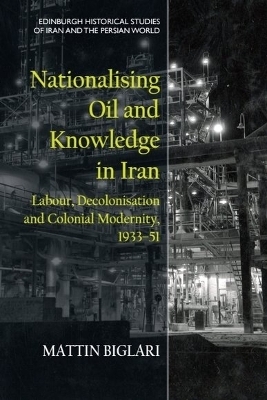
Nationalising Oil and Knowledge in Iran
Labour, Decolonisation and Colonial Modernity, 193351
Seiten
2025
Edinburgh University Press (Verlag)
978-1-4744-8960-7 (ISBN)
Edinburgh University Press (Verlag)
978-1-4744-8960-7 (ISBN)
- Noch nicht erschienen (ca. Februar 2025)
- Versandkostenfrei innerhalb Deutschlands
- Auch auf Rechnung
- Verfügbarkeit in der Filiale vor Ort prüfen
- Artikel merken
How did British oil production in Iran shape both subaltern anticolonialism and colonial afterlives in the country?
Iran's nationalisation of oil in 1951 was a key catalyst for the rise of resource nationalism as an animating force of global decolonisation, expelling the Anglo-Iranian Oil Company (AIOC, now known as BP) after nearly fifty years of domination in southwest Iran. Nationalising Oil & Knowledge in Iran turns attention to the origins of nationalisation in the everyday struggles between the oil company and subaltern actors in the city of Abadan, then home to the world's largest oil refinery and deeply imbricated in networks of colonialism and racial capitalism.
Engaging with energy history, postcolonial/subaltern studies, and science & technology studies, the book focuses on the politics of expertise: how nationalisation reproduced the epistemic coloniality of the oil company, which rested on local dispossession, social engineering, as well as racial and gendered segregation. It argues that nationalisation diverged from subaltern contestations of oil expertise in Abadan, which presented a more fundamental challenge to colonial modernity.
Iran's nationalisation of oil in 1951 was a key catalyst for the rise of resource nationalism as an animating force of global decolonisation, expelling the Anglo-Iranian Oil Company (AIOC, now known as BP) after nearly fifty years of domination in southwest Iran. Nationalising Oil & Knowledge in Iran turns attention to the origins of nationalisation in the everyday struggles between the oil company and subaltern actors in the city of Abadan, then home to the world's largest oil refinery and deeply imbricated in networks of colonialism and racial capitalism.
Engaging with energy history, postcolonial/subaltern studies, and science & technology studies, the book focuses on the politics of expertise: how nationalisation reproduced the epistemic coloniality of the oil company, which rested on local dispossession, social engineering, as well as racial and gendered segregation. It argues that nationalisation diverged from subaltern contestations of oil expertise in Abadan, which presented a more fundamental challenge to colonial modernity.
| Erscheint lt. Verlag | 28.2.2025 |
|---|---|
| Zusatzinfo | 37 black and white illustrations |
| Verlagsort | Edinburgh |
| Sprache | englisch |
| Maße | 156 x 234 mm |
| Themenwelt | Geisteswissenschaften ► Geschichte ► Allgemeine Geschichte |
| Geisteswissenschaften ► Geschichte ► Regional- / Ländergeschichte | |
| Geschichte ► Teilgebiete der Geschichte ► Kulturgeschichte | |
| Geschichte ► Teilgebiete der Geschichte ► Wirtschaftsgeschichte | |
| Sozialwissenschaften ► Ethnologie | |
| Sozialwissenschaften ► Soziologie | |
| Technik ► Elektrotechnik / Energietechnik | |
| ISBN-10 | 1-4744-8960-5 / 1474489605 |
| ISBN-13 | 978-1-4744-8960-7 / 9781474489607 |
| Zustand | Neuware |
| Haben Sie eine Frage zum Produkt? |
Mehr entdecken
aus dem Bereich
aus dem Bereich
der stille Abschied vom bäuerlichen Leben in Deutschland
Buch | Hardcover (2023)
C.H.Beck (Verlag)
23,00 €
vom Mittelalter bis zur Gegenwart
Buch | Softcover (2024)
C.H.Beck (Verlag)
12,00 €
eine Geschichte der Welt in 99 Obsessionen
Buch | Hardcover (2023)
Klett-Cotta (Verlag)
22,00 €


